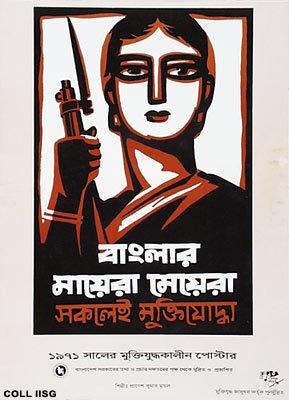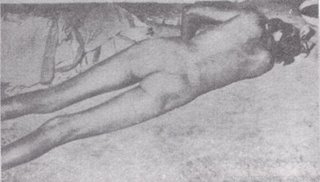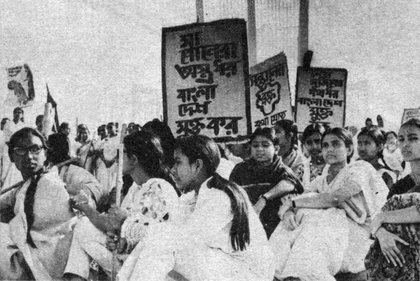Women in 1971
Gen. A. A. Khan Niazi did not deny rapes were being carried out and opined, in a Freudian tone, "You cannot expect a man to live, fight, and die in East Pakistan and go to Jhelum for sex, would you?"
Atrocities against Bengali women:
Two [Pakistani soldiers] went into the room that had been built for the bridal couple. The others stayed behind with the family, one of them covering them with his gun. They heard a barked order, and the bridegroom's voice protesting. Then there was silence until the bride screamed. Then there was silence again, except for some muffled cries that soon subsided. In a few minutes one of the soldiers came out, his uniform in disarray. He grinned to his companions. Another soldier took his place in the extra room. And so on, until all the six had raped the belle of the village. Then all six left, hurriedly. The father found his daughter lying on the string cot unconscious and bleeding. Her husband was crouched on the floor, kneeling over his vomit. (Quoted in Brownmiller, Against Our Will, p. 82.)
Rape, abduction and forcible prostitution during the nine-month war proved to be only the first round of humiliation for the Bengali women. Prime Minister Mujibur Rahman's declaration that victims of rape were national heroines was the opening shot of an ill-starred campaign to reintegrate them into society — by smoothing the way for a return to their husbands or by finding bridegrooms for the unmarried [or widowed] ones from among his Mukti Bahini freedom fighters. Imaginative in concept for a country in which female chastity and purdah isolation are cardinal principles, the "marry them off" campaign never got off the ground. Few prospective bridegrooms stepped forward, and those who did made it plain that they expected the government, as father figure, to present them with handsome dowries. (Brownmiller, Against Our Will, p. 84.)
Books:
" …..Some army officer raided the Rokeya Hall, the girls' hostel of Dacca University, on October 7, 1971. Accompanied by five soldiers, Major Aslam had first visited the hostel on October 3, and asked the lady superintendent to supply some girls who could sing and dance at a function to be held in Tejgaon Cantonment. The superintendent told him that most of the girls had left the hostel after the disturbances and only 40 students were residing but as a superintendent of a girls' hostel she should not allow them to go to the cantonment for this purpose. Dissatisfied, Major Aslam went away. Soon after the superintendent informed a higher army officer in the cantonment, over the telephone, of the Major' s mission.However, on October 7, at about 8 p.m. Major Aslam and his men raided the hostel. The soldiers broke open the doors, dragged the girls out and stripped them before raping and torturing them in front of the helpless superintendent. The entire thing was done so, openly, without any provocation, that even the Karachi-based newspaper, Dawn, had to publish the story, violating censorship by the military authorities. In seven days after liberation about 300 girls were recovered from different places around Dacca where they had been taken away and kept confined by the Pakistani army men. On December 26, altogether 55 emaciated and half-dead girls on the verge of mental derangement were recovered by the Red Cross with the help of the Mukti Bahini and the allied forces from various hideouts of the Pakistani army in Narayanganj, Dacca Cantonment and other small towns on the periphery of Dacca city.
Articles:
…..We have collected numerous evidences on the rape, molestation and torture of Bangalee women by the Pakistani army. Rauful Hossain Suja, the son of martyr Akbar Hossain of Pahartali, Chittagong, went to the FOY'S LAKE KILLING ZONE to look for his father's dead body. They found dead bodies of approximately 10,000 Bangalees, most of them were brutally slaughtered. In their desperate search for their father's dead boy, they found dead bodies of 84 pregnant women whose abdomens were slashed open. This type of brutality took place almost every where in Bangladesh. Raped women were also locked up naked in various military camps so as to deny them termination of their anguish through suicide.As per our statistics on the abortion centers and hospitals around the country, less than 10% of the total raped women visited those centers. In most cases the abortions were done locally and efforts were taken to keep those incidents secret due to social situation. The doctors and specialists, like Dr Anwarul Azim, involved in the hospitals and abortion centers agreed to this statistical information. In reality the raped women who became pregnant after September and less than three months pregnant in early 1972, they did not go the abortion centers and hospitals at all. In our account, the number of women of this category was at least 88,200. Moreover, in those three months, raped 162,000 women and 131,000 Hindu refugee women simply disappeared, assimilated into the vast population, without any report at all.
"I came out and saw the army. They wanted to go inside. I put my hands up like this and said there was no one inside. They flung me away into the yard and dragged my husband and son outside. They shot them both right there, there.They killed every male in the village, every male. When the army was gone, there was not a single man left to bury the dead. We had to drag the bodies ourselves and bury them."
A stream of victims and eyewitnesses tell how truckloads of Pakistani soldiers and their hireling razakars swooped down on villages in the night, rounding up women by force. Some were raped on the spot. Others were carried off to military compounds. Some women were still their when Indian troops battled their way into Pakistani strongholds. Weeping survivors of villages razed because they were suspected of siding with the Mukti Bahini freedom fighters told how wives were raped before their eyes of their bound husbands, who were then put to death. Just how much of it was the work of Pakistani "regulars" is not clear. Pakistani officers maintain that their men were too disciplined "for that sort of thing".
"I am certain that troops have raped girls repeatedly, then killed them by pushing their bayonets up between their legs."
"It has now become a ritual, come December and March, to bemoan why no justice was exacted from the Pakistan military and its collaborators, for the crimes of genocide and mass rape, committed in 1971. This is not for lack of evidence."
Girls had been discovered in the bunkers, which were next to the university guesthouse. He went on, I went and found her, she was lying like that. People were milling around her, they were in front of her, they were behind her. I asked them to move, I made some space, and then I took photographs. Girls had been discovered in the bunkers, which were next to the university guesthouse. He went on, I went and found her, she was lying like that. People were milling around her, they were in front of her, they were behind her. I asked them to move, I made some space, and then I took photographs.
Historical Documents:
A New York Times article from 1972
Rape Denials:
__._,_.___
*****************************************
Sign the Petition : Release the Arrested University Teachers Immediately : An Appeal to the Caretaker Government of Bangladesh
http://www.mukto-mona.com/human_rights/university_teachers_arrest.htm
*****************************************
Daily Star publishes an interview with Mukto-Mona
http://www.mukto-mona.com/news/daily_star/daily_star_MM.pdf
*****************************************
MM site is blocked in Islamic countries such as UAE. Members of those theocratic states, kindly use any proxy (such as http://proxy.org/) to access mukto-mona.
*****************************************
Mukto-Mona Celebrates 5th Anniversary
http://www.mukto-mona.com/Special_Event_/5_yrs_anniv/index.htm
*****************************************
Mukto-Mona Celebrates Earth Day:
http://www.mukto-mona.com/Special_Event_/Earth_day2006/index.htm
*****************************************
Kansat Uprising : A Special Page from Mukto-Mona
http://www.mukto-mona.com/human_rights/kansat2006/members/
*****************************************
MM Project : Grand assembly of local freedom fighters at Raumari
http://www.mukto-mona.com/project/Roumari/freedom_fighters_union300306.htm
*****************************************
German Bangla Radio Interviews Mukto-Mona Members:
http://www.mukto-mona.com/Special_Event_/Darwin_day/german_radio/
Mukto-Mona Celebrates Darwin Day:
http://www.mukto-mona.com/Special_Event_/Darwin_day/index.htm
*****************************************
Some FAQ's about Mukto-Mona:
http://www.mukto-mona.com/new_site/mukto-mona/faq_mm.htm
****************************************************
VISIT MUKTO-MONA WEB-SITE : http://www.mukto-mona.com/
****************************************************
"I disapprove of what you say, but I will defend to the death your right to say it".
-Beatrice Hall [pseudonym: S.G. Tallentyre], 190
Change settings via the Web (Yahoo! ID required)
Change settings via email: Switch delivery to Daily Digest | Switch to Fully Featured
Visit Your Group | Yahoo! Groups Terms of Use | Unsubscribe
__,_._,___


